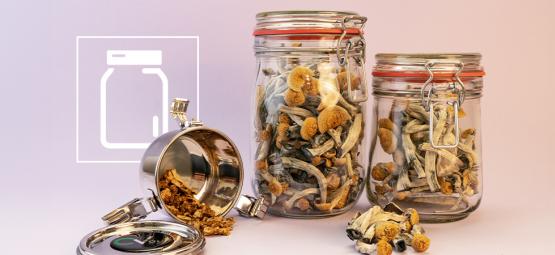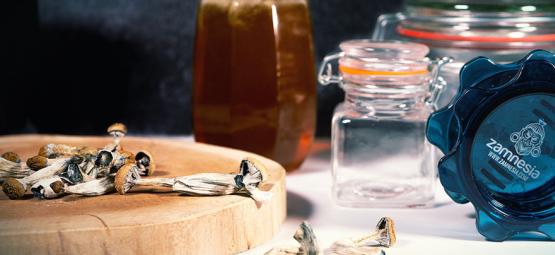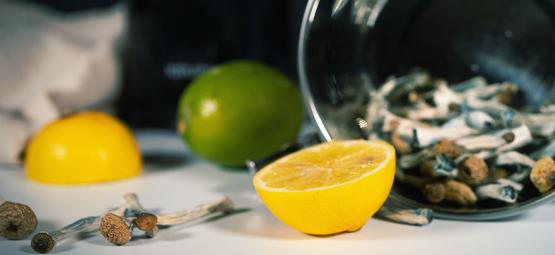How To Dry Magic Mushrooms
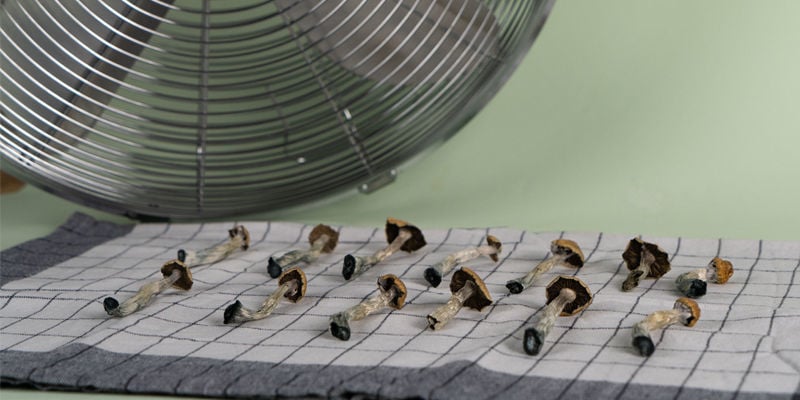
Magic mushrooms can be consumed fresh, but unless you're planning a super-heroic, ego-obliterating trip of a lifetime, you'll likely want to dry and save at least some of your freshly harvested shrooms for later. Keep reading to learn how to properly dry magic mushrooms at home.
Growing magic mushrooms takes a lot of care and patience. So when harvest time finally crawls around, the last thing you want is for your shrooms to spoil and go to waste. That's where drying comes in; when dried properly, magic mushrooms can be stored for months without losing their flavour or potency. In this article, we'll teach you the ins and outs of perfectly drying psilocybin mushrooms at home.
Pre-Drying Your Magic Mushrooms
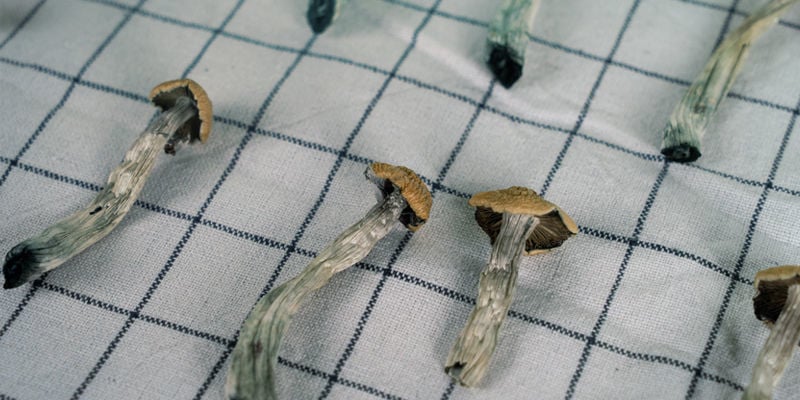
Magic mushrooms should be harvested right before the veil tears away from the cap. This piece of the mushroom's anatomy serves to cover the spore-bearing gills. As soon as this occurs, it's time to pluck and pre-dry your shrooms.
Pre-drying is a method of removing excess water from your harvest before thoroughly drying them out. At the end of the drying process, you'll want your mushrooms to be bone dry—they should snap when you attempt to bend them. Any remaining water could encourage contamination and potentially spoil all of your hard work. Moreover, pre-drying is essential as it makes it much easier to weigh out more consistent doses when the time comes.
To pre-dry your shrooms, place them on a piece of cardboard or dry towel. Make sure they are evenly spread out so they're not touching. Move your cardboard/towel to a well-ventilated area out of direct sunlight, such as on top of your fridge or on a shelf in a walk-in closet. Alternatively, place the cardboard in front of a fan to air them out.
Either method will pre-dry your mushrooms within a matter of hours. Check on them every now and then, and watch how they change in appearance. Once they appear wrinkly to the eye and rubbery to the touch, pre-drying is complete. Note that if you're using towel instead of cardboard, you may need to change it every so often to avoid retaining too much moisture.
Cutting Or Tearing Mushrooms: Is It Bad For Potency?
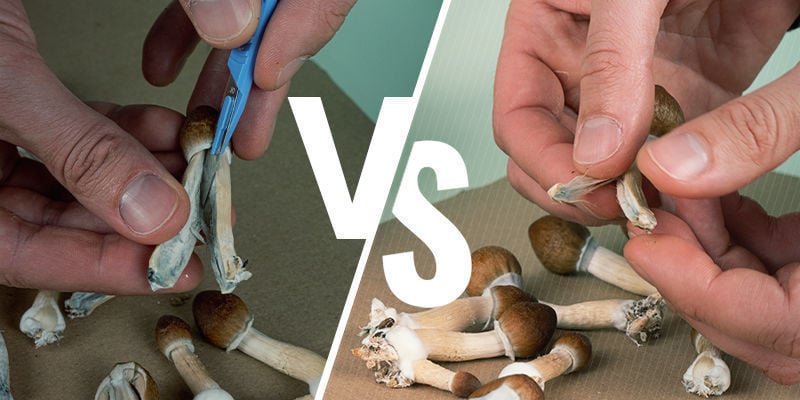
If your flush has put out some giant mushrooms, you might want to reduce their size for storage. Cutting or tearing mushrooms will increase their surface area and make them easier to dry, but can it reduce their potency?
The jury is still out on this one. The lack of scientific data makes it a case of one anecdotal account over another. Some growers claim that slicing or cutting their mushrooms before drying made no difference in terms of psychoactive effects. In contrast, other cultivators state that cutting fruit bodies ruptures the cell walls of the mycelium, resulting in excessive bluing and potential loss of potency, whereas tearing mushrooms may keep the cell wall intact.
It's a matter of personal preference. We can't say for sure which is the correct method. Ultimately, thoroughly drying your stash is more important than a slight reduction in potency.
The Easiest Magic Mushroom Drying Methods
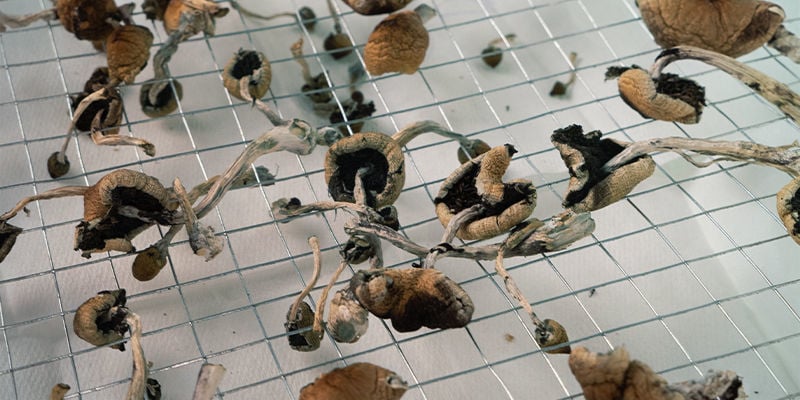
There are many ways to dry your mushroom harvest. Here, we'll present you with the three easiest ways to eliminate your fungi of moisture:
Air Drying
Air drying is the cheapest and easiest way to dry magic mushrooms. However, this method won't always turn your mushrooms bone dry. Moreover, it's an unreliable method in humid environments.
Use A Dehydrator
Dehydrators are an excellent way to dry magic mushrooms. They use a gentle heat source and constant airflow to gradually and evenly remove moisture. Although they're useful, they come at a cost.
Drying Using A Desiccant
Buying or making your own desiccant is another effortless way to sap any lingering moisture from your prized mushrooms. Just ensure you've pre-dried your mushrooms as best you can before letting the desiccant do its thing.
Shroom Shop
Zamnesia's Shroomshop offers an extensive selection of mushroom cultivation supplies, including spore prints, liquid cultures, grow kits, and much more.
Air Drying Magic Mushrooms
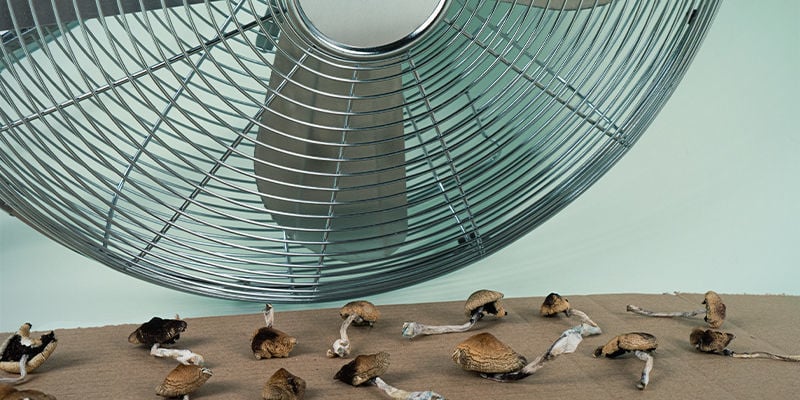
The easiest and most accessible way to dry your harvest is with air drying—it's effectively a continuation of the pre-drying process. Over time, with heat and proper airflow, most of the water content will leave the fruit bodies. However, air drying will only work if the relative humidity of the environment is below a certain threshold, around 55% RH. If you're not sure how humid your room is, use a hygrometer to measure the humidity.
The downside to air drying is consistency. In some cases, when the environment is optimal, your shrooms will become dry as dust. In others, they'll retain moisture in the centre and be prone to contamination.
What You Need
- Dry piece of cardboard
- Fan
- Radiator/well-ventilated spot out of direct sunlight
The Drying Process
Place the cardboard on a desk. Spread the mushrooms out evenly across it. Make sure none of them are touching, as this can cause moisture to become trapped.
Place the fan in position so it's blowing a constant airflow over the mushrooms. If you have a dry environment, you can place the cardboard in a well-ventilated area without using a fan. If your environment is particularly humid, place the cardboard close to a radiator and set up the fan to blow air over it.
Check on your mushrooms every day. After just a few hours, they'll start to become more rigid and dry. The process is complete when they become so dry that they snap when bent.
Drying Magic Mushrooms Using A Dehydrator
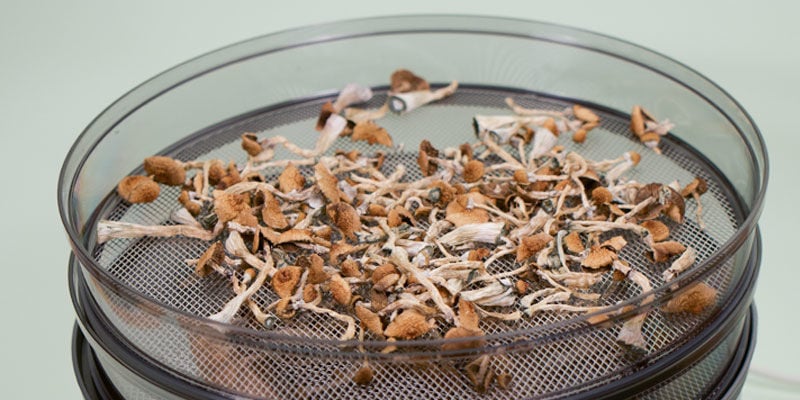
A dehydrator is an optimal way to dry magic mushrooms. These devices remove the water content of substances using a heat source and airflow. This allows for long-term storage and minimises the risk of contamination. The heating element will warm the mushrooms, causing water to be released. Internal fans blow the hot air through vents and out of the device, preventing heat from building up.
Using a dehydrator is the most expensive way to dry shrooms, but it's a worthy investment, especially if you plan on cultivating mushrooms regularly.
Which Dehydrator To Use?
There are a few factors to consider when looking for a dehydrator for your mushrooms. Of course, the main consideration is budget, but otherwise, there are plenty of available choices out there.
Essentially any store-bought food dehydrator is likely to do the trick for you. Intuitive and easy to use, it's a simple case of loading it up with mushrooms, turning it on, and then leaving them to dehydrate. However, many dehydrators come with a timer option, so if you're looking to dial in a specific length of time to get the best from your mushrooms, this can be easily achieved.
How To Dry Using A Dehydrator
Spread your pre-dried mushrooms out evenly across the drying racks, making sure none of them are touching. Slide the loaded trays into the dehydrator. Set the device to a low temperature setting (around 40°C) to keep the psilocybin intact.
The whole process will take between 4–8 hours, depending on how long you pre-dried. Check on your mushrooms every hour or so to see how they're getting on. Test their structure to see how resistant they are. Once they snap under pressure, they're ready for storage.
Drying Magic Mushrooms Using A Desiccant
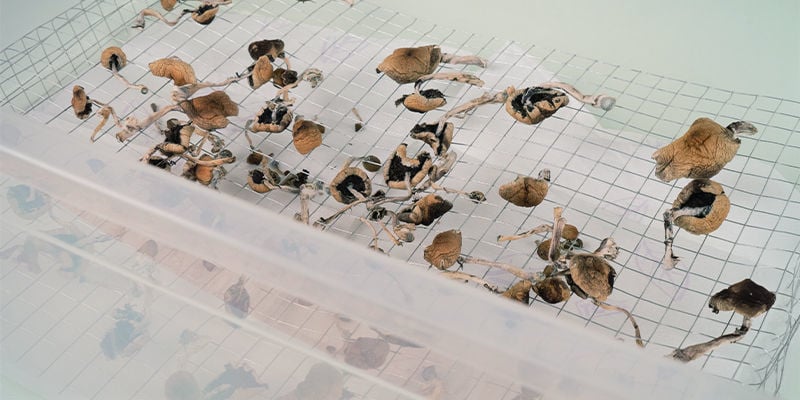
Drying mushrooms isn't just limited to heat and airflow. Desiccants can also be used to pull moisture out of your mushrooms. A desiccant is a solid that absorbs water. When placed into a container along with pre-dried mushrooms, it works to remove moisture from the fruits.
Using a desiccant is a cheap way to dry your shrooms, but you need to ensure they have been thoroughly pre-dried.
What Is A Desiccant?
Put simply, a desiccant is a substance that absorbs water from the atmosphere. Silica gel is the most commonly encountered desiccant. It's often found in industrial packaging, but also in foods that need to stay dry.
The most cost-efficient and environmentally friendly way to dry magic mushrooms is to make a desiccant yourself. It's much easier than it sounds; essentially you're just baking Epsom salt from your local pharmacy.
The chemistry behind it goes like this: Epsom salt is magnesium sulfate, which has the chemical formula MgSO₄ · 7H₂O. Remember, water is H₂O; you see that 7H₂O in the formula? There are seven water molecules attached, which makes this magnesium sulfate heptahydrate.
Now, if you bake the heptahydrate, the seven water molecules will evaporate, leaving you with MgSO₄, anhydrous magnesium sulfate. Because MgSO₄ wants to gain these seven water molecules back, it will absorb water from the atmosphere until it's saturated. If we put the mushrooms together with the MgSO₄, it will pull out all the water from the mushrooms.
Requirements
- Store-bought Epsom salt
- Baking tray
- Hammer
- Airtight, heat-resistant container
- Oven
Preparing The Desiccant
- Fill your baking tray with a 1cm-thick layer of Epsom salt.
- Preheat your oven to 230–250°C. The closer you can get to 250°, the better.
- Put the Epsom salt in the oven and leave it to bake for about 2 hours. This will remove all of the moisture present.
- Your anhydrous magnesium sulfate will start absorbing moisture from the air as soon as you take it out of the oven, so you will need to be quick—do not wait for it to cool down. The salt will have become one solid cake; take your hammer and break it up into pieces.
- Place it in airtight containers as soon as possible, while still hot. You do not need to worry about your Epsom salt re-humidifying entirely within this time, but the faster you can do it, the better. You now have homemade desiccant.
Now that you have prepared your desiccant, you can thoroughly dry your magic mushrooms. Keep in mind that you can re-bake and reuse the Epsom salt later on for future harvests.
What You Need
- Your homemade desiccant
- Plastic container with airtight lid large enough to hold your desiccant and mushrooms
- Paper towels
- Metal mesh
- Pre-dried magic mushrooms
The Process
- Place your desiccant in your plastic container as a bottom layer.
- Cover your desiccant with a layer of paper towels.
- Bend your metal mesh around the sides and place it in the container so that the mesh creates a platform to hold the mushrooms above the paper towels.
- You do not want to run any risk of the mushrooms coming into physical contact with the desiccant.
- Place your magic mushrooms on top of the metal mesh.
- Place the airtight lid on the container.
- The desiccant will now start to absorb all of the moisture from the mushrooms. The container must be airtight so that the only moisture available is from the mushrooms and trapped air.
Check back every couple of days to see how dry the mushrooms have become. Once again, they will be ready when they snap.
Storing Dried Magic Mushrooms
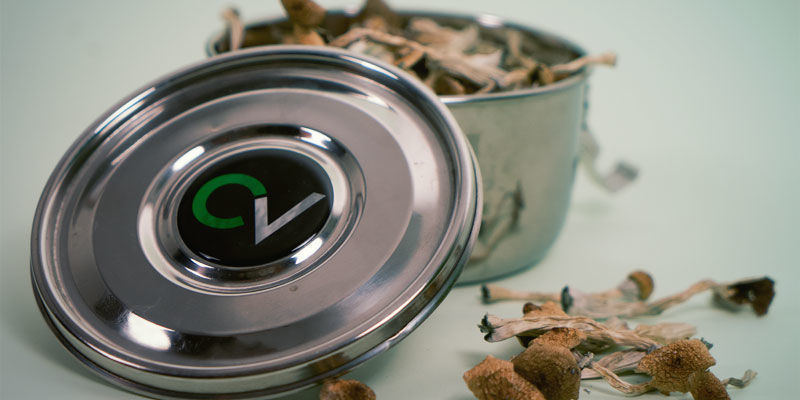
Now that you've dried your shrooms, it's time to store them. Like most dried goods, magic mushrooms are best stored away from direct light, heat, and moisture. To ensure your shrooms stay tasty and potent for as long as possible, keep them in a cool, dark, adequately dry location.
Where To Store Your Magic Mushrooms
Excess light exposure will speed up the degradation process, and moisture will, once again, pose a contamination risk. Store your mushrooms in a cool, dark place—such as a kitchen cupboard—to maximise their shelf life.
Dry your shrooms like a pro
Drying magic mushrooms is key to extending their shelf life and preserving their flavour and potency. Make sure to keep this article on hand come harvest time to perfectly dry your shrooms and help them keep for months!
You might also like











 United States
United States


